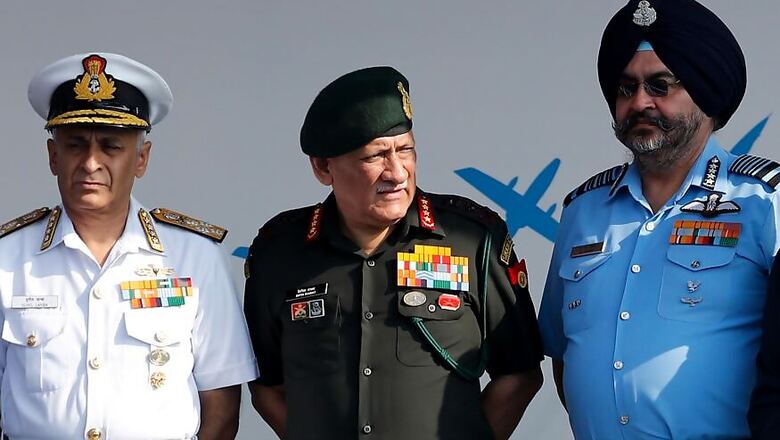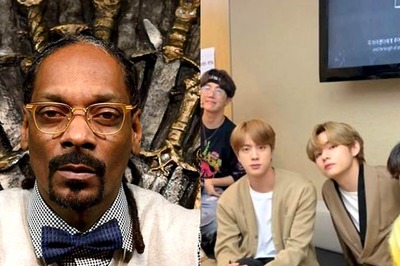
views
In what is the biggest reform announced by Prime Minister Narendra Modi in his first Independence Day address of his second term, the creation of the Chief of Defence Staff (CDS) post is a development that will be keenly followed.
"Reform is also necessary. Defence reform has been in the works for a long time now and reports have been tabled several times. The rules of war are changing and India can’t think in a bubble...Our forces are India's pride. To further sharpen coordination between the forces, I want to announce a major decision from the Red Fort: India will have a Chief of Defence Staff (CDS)," PM Modi said in his speech on Thursday.
The move, aimed at creating a single point-of-contact in coordinating with the three armed services in day-to-day administrative functioning as well as to ensure synergy in training, logistics, planning and procurements among the forces and to them in time of crisis, has been pending for decades now.
The first signs that CDS was becoming a reality came in a combined commanders' conference at Dehradun's Indian Military Academy held last year between the three service chiefs - then Navy chief Admiral Sunil Lanba, Army chief General Bipin Rawat and Air Chief Marshal B S Dhanoa. The conference was presided over by the-then defence minister Manohar Parrikar and Modi. The reforms proposed at the time ranged from creating the post of the fourth four-star general and theatre commands to re-energising joint training and doctrines.
In the brainstorming session it was also agreed upon that the country will have theatre commands to integrate its air, land and sea assets under single operational commanders for a greater military punch from limited budgetary resources.
Although, as of now the powers and responsibilities, the rank and portfolio, of the CDS is unclear, it is certain that Modi has set the ball rolling in that direction, and a formal announcement is likely to be made soon.
Who among the three service chiefs will be appointed the CDS is also not clear at this point. While Air Chief Marshal BS Dhanoa is the most senior of the three service chiefs, General Bipin Rawat whose retirement is due on December 31, three months after the Air Chief's retirement, is said to be a front runner for this post.
When Was this First Broached
It was right after the 1999 Kargil War that a high-level committee headed by K Subrahmanyam, international strategic affairs expert, set up to examine the gaps in the country's security system in the wake of the conflict, had recommended that the three services should have a Chief of Defence Staff.
The committee had recommended that the CDS would be a five-star military officer and should be the single-point military adviser to the defence minister.
Besides the high-level committee on Kargil War, a group of ministers that was formed in 2001 to explore reforms necessary for the improvement pf India's national security had also favoured creating the post of Chief of Defence Staff.
More Support for CDS
Another 14-member task force, headed by Naresh Chandra, a former bureaucrat who held offices in the ministry of defence and prime minister’s office, also recommended the creation of the post of a permanent chairman of the Chiefs of Staff Committee (CoSC).
The CoSC, which is a post held by the national security adviser by default, was to be a full-time post held by the senior-most among the three service chiefs.
The case for a CDS has been built around the argument that it is necessary to have a professional body of the highest standing to facilitate 'jointmanship' and render single-point military advice to the government on matters of national security, former Army chief General NC Vij had said in an article for India Today magazine in 2016.
Why the Delayed Decision
No government could till now get political consensus on this issue over the past two decades. The Group of Ministers, which had favoured CDS in 2001, had said it should be done with political consensus. In 2016, the government informed Parliament that this consultation process could not be completed because all the political parties had not responded.
But the real, lurking fear among the political class, was touched upon by Lt Gen (retd) H S Panag in a recent article: "Despite the political control over the armed forces clearly established in Constitution, the politicians have this lurking fear. They do not want the executive military power to be concentrated in the hands of a single person – the Chief of Defence Staff."
In his article, Panag wrote that a Chinese military officer took his advice as People’s Liberation Army (PLA) was moving towards creating a CDS-like post.
While the "the PLA, army, navy, air force and rocket forces were fully integrated into five theatre commands under a joint headquarters, at Ürümqi, which in turn operates under the Central Military Commission...By contrast, we have three army and three air force commands carrying same names – Western, Central and Eastern – and located at different places", he wrote.
Modi has now shown the boldness to meet this long-pending demand, with a confidence that earlier political leaders had not exhibited.
Reacting to the PM's announcement, Gen (retd) VP Malik, who was the Army chief during Kargil War, tweeted, "Thank you PM Modi for announcing historic step of institution of CDS. This step will make our national security more effective and more economical. It will ensure better jointmanship and multi-disciplinary coordination. Salute!"


















Comments
0 comment